nuclear war

Minus One, which premiered in U.S. theaters on Dec. 1, became the highest grossing Japanese live-action film in U.S. history.

IN NOVEMBER, a stray missile from the Russia-Ukraine war landed in Poland, killing two men in their 60s who worked at a grain warehouse. It took several emergency meetings with NATO officials to determine whether Russia had intentionally escalated the war into the region of the Western military alliance. All parties deemed it an “accident.” (The missile came from Ukraine.)
What if that stray missile had a nuclear warhead?
Russian President Vladimir Putin’s threat to use nuclear weapons in Ukraine must be firmly condemned, as well as his cruel and illegal war with its continued escalation. But accidents happen. Even a limited or regional use of nuclear weapons could have planetary effects, blocking the sun enough to cause a global temperature drop, collapsing crop production, and resulting in massive starvation, according to a report by the International Physicians for the Prevention of Nuclear War.
As the Poland example shows, today we are facing the most serious nuclear threats since the Cuban missile crisis 60 years ago, which then-Secretary of Defense Robert McNamara said we survived only by luck.
Nuclear weapons raise biblical issues. The continuing survival of God’s creation and the human race cannot rely on just “luck” but instead needs providential intervention. A few weeks before the November missile crisis in Poland, Pope Francis said, “Today, in fact, something we dreaded and hoped never to hear of again is threatened outright: the use of atomic weapons, which even after Hiroshima and Nagasaki continued wrongly to be produced and tested.”

President Vladimir Putin’s announcement on Sunday that he had ordered Russian nuclear forces to high alert (he called it a “special mode of combat duty”) brought to mind some of the most dangerous days of Cold War brinkmanship. For four decades, bellicose Soviet and American rhetoric and actions — from the Cuban missile crisis to Reagan administration talk of a “winnable” nuclear war — kept the world at very real risk of annhilation. (The Biden administration, to its credit, responded this week to Putin’s provocations by asserting, correctly, that “A nuclear war cannot be won, and must never be fought,” as a White House offical put it to Reuters, and declined to escalate the U.S. nuclear alert status.)
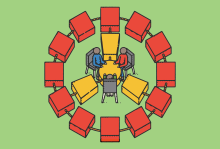
THE INTERNATIONAL COMMUNITY is scrambling to salvage the 2015 Iran nuclear deal after the United States withdrew from it in 2018 and reimposed harsh sanctions on Iran. At stake is how much sanctions relief to offer in return for robust international oversight of Iran’s nuclear program. Blockchain technology allows us to fundamentally reframe this question: What if countries could offer real-time visibility of their nuclear programs in return for positive financial incentives?
Blockchain is an information management tool for governing large networks in low-trust environments. Uniquely, however, it can both facilitate and financially incentivize cooperation among nontrusting parties. This suggests a potential role for blockchain in normalizing habits of international cooperation, including by helping build trust in nuclear nonproliferation and disarmament agreements.
At least three attributes of blockchain are relevant in that regard.
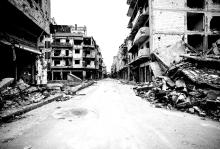
You can’t blame me for flinching
back against the wall
when a small boy points his
pistol at me and yells “Pow! Pow! Pow!”
I am lying back there somewhere
feeling the sidewalk as if I’d never touched
sunshine, pumping out my urgent
puddle
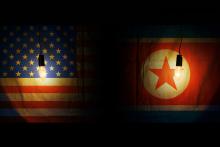
As Trump and Kim Jong-un approach possible conversations, here are 3 truths for American Christians to keep in mind.
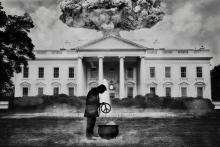
What goes unmentioned is that we already have over 1,000 nuclear warheads in our arsenal with low-yield options, to say nothing of the fact that the more nuclear weapons you introduce into the world, the more likely it is that they’ll one day be used.

This is why those Catholics and other Christians who hold that armed force may sometimes be morally justifiable (i.e., just war theory) tend to be "nuclear pacifists” — nuclear war would probably be total war, violating just war principles such as noncombatant immunity and proportionality. And a "first use" to prevent an attack that is not both imminent and grave raises even more red flags.
1. Inside the Faith-Led Counter-Protest to Charlottesville’s White Supremacist Rally
Starting this evening, clergy are gathering in Charlottesville, Va., to pray and protest the “Unite the Right” rally scheduled for this weekend.
2. How Fossil Fuel Money Made Climate Change Denial the Word of God
The story behind evangelicals’ resistance to climate science.

The point is not that North Korea should be given free-reign by the international community to develop any and all weapons that it so chooses. But Gollwitzer would have American Christians remember that they are called to be a political influence in the service of peace. For Gollwitzer, you can tell whether Christians have understood the gospel by whether they reject war under nuclear conditions: “the ‘Yes’ to the Gospel and the ‘No’ to war today must go together — or both will be lost” (Demands of Freedom, p. 136.).

The White House announced May 10 that President Obama will travel to Hiroshima, Japan, reports The New York Times.
This will be the first time a sitting U.S. president has visited the city where the U.S. dropped an atomic bomb at the end of World War II.
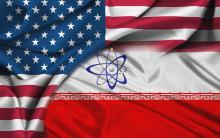
The United States and Iran agreed to a preliminary deal on Iran's nuclear program today, Politico reports. The hotly anticipated deal, following stop-and-start negotiations and vocal concern from Republicans and Israeli Prime Minister Benjamin Netanyahu, will include Iran dismantling two-thirds of its centrifuges and allowing rigiourous inspections by the IAEA through 2035 and beyond. In exchange for Iran's compliance, the U.S. and the E.U. will lift longstanding economic sanctions.
President Obama was optimistic but pragmatic, saying the plan was a "good deal," according to Politico:
"'[It is] a historic understanding with Iran which, if implemented, will prevent it from obtaining a nuclear weapon. I am convinced that if this framework leads to a final deal, it will make our country and the world safer,' Obama said in a statement in the White House Rose Garden. The deal would 'cut off every pathway that Iran could take to develop a nuclear weapon.'
... Obama stressed in particular the inspection and verification aspects of the agreement. 'If Iran cheats, the world will know it. If we see anything suspicious, we will inspect it,' Obama said.
...'If there is backsliding on the part of the Iranians,' he said, 'there will be no deal.'"
The Win Without War coalition called the preliminary deal "huge news" in a statement, also released today:
"At a time when much of the Middle East is engulfed in war, the United States is on the verge of achieving one of our most pressing national security goals without dropping a single bomb. Today's progress towards a comprehensive, historic agreement between Iran, the United States, and our P5+1 partners not only ensures that Iran will not get a nuclear weapon, but it demonstrates precisely how America can win without war."
Details of the plan are anticipated in late June. Read more at Politico.
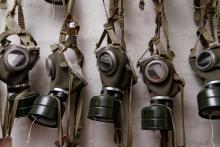
Setsuko Thurlow was 13 when “progress” came to Hiroshima in a white-hot flash. In the dark silence following the nuclear bomb blast, Thurlow recalls children crying, “Mama, help me. God, help me.”
Her sister lived for four days. Many of her 351 dying schoolmates “looked like skeletons with skin hanging from their bones.”
They perished in agony.
Today, Thurlow and other survivors travel the globe, sharing their stories with a new generation for which nuclear weapons are an afterthought — seemingly a hypothetical and abstract threat.
The end of the Cold War had a mixed effect on the nuclear equation. Through dogged diplomacy and effective institutions, disarmament continues, though at a slower pace in recent years. There are now 10,000 operational nuclear warheads in the world, down from a high of 64,000 in 1986.
But the specter of nuclear terrorism and regional conflicts between nuclear weapons states makes nuclear weapons even more dangerous in our international system. Deterrence theory, which governed strategic thinking during the Cold War, is a much less compelling framework today.
Thankfully, most states have forsworn these armaments. Nuclear weapons are not vital to any state’s legitimate security interest. No state or NGO has the capacity to respond to the unfathomable humanitarian crisis that would follow an accidental or intentional use of a nuclear weapon.
Thus a growing global consensus now acknowledges the extreme risk nuclear weapons pose.
Pope John XXIII stated unequivocally in his 1963 encyclical “Pacem in Terris,” “Nuclear weapons must be banned.”
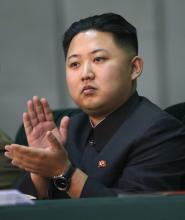
The fact that North Korea’s young leader Kim Jong-un is threatening the world with nuclear holocaust does what World War I did to many theologians who had presumed that history was on a course of inevitable progress.
It is not.
The power of death is enticing, a sin to which Robert Oppenheimer, the father of the bomb, later confessed. The human will to power becomes evil when real soldiers, real nuclear bombs, real missiles, and real threats of destruction are mistaken for childhood toys or computer games where human folly can be erased by hitting a reset button.
We are all children inside, for good and for ill.
On December 13, a Tacoma-based jury declared five Disarm Trident Now Plowshares activists "guilty" of trespass, felony damage to federal property, felony injury to property, and felony conspiracy to damage property.

The United States still worships at the altar of nuclear weapons - yet cries 'heresy' when others want to join the sect.
